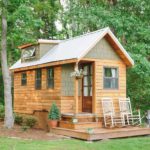Buying or building a tiny house in Montgomery County can be a way to get out from under the burden of a home loan—or at least lead to a smaller mortgage – but you need to know what regulations govern tiny houses here. Tiny houses and attached apartments have been permitted by Montgomery County’s residential zoning code since 2019 despite pushback from residents.
County Council Approves Zoning Changes

Since July 2019, tiny houses and attached apartments are allowed in Montgomery County despite resistance from residents. In July 2019, the county council voted unanimously in favor of zoning changes that make it easier for residents to create accessory apartments on their property. The council also approved the zoning changes to create more affordable housing units for low-income residents and retirees. The changes eliminated a provision that neighborhoods can only have one accessory unit every 300 or 500 feet, depending on the zone in which it’s located. The changes also removed a ban on tiny homes and other detached apartments on smaller lots, like those often found in Silver Spring and Bethesda.
Lack of Affordable Housing in MoCo
The vote to facilitate the construction of tiny homes and accessory apartments was intended to address the lack of

affordable housing in the county. The Metropolitan Washington Council of Governments says by 2045 the region needs 575,000 additional housing units. The Council President Nancy Navarro said she did not expect a significant proliferation of tiny homes after passage of the new legislation but that it would hopefully provide some additional housing. If you are looking for a small home under $450,000 in Montgomery County MD, you might think they don’t exist, but they do. Click here to see some detached small homes under $450,000.
Opposition to Tiny Houses
Over a thousand Montgomery County residents signed a petition opposing the changes. Several reasons were given for the opposition, such as a fear that housing prices in the county would fall. One person said at a protest that the new law would allow people to do whatever they want in their backyards. Others citizens said it will create crowded neighborhoods and increased traffic congestion. Some opposed the bill because they said it would attract low-income residents and lower the cost of housing. Still others feared that the new regulations would encourage more transient residents who would disrupt the sense of community in their neighborhoods.
